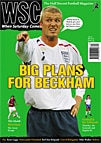 Twenty-five years ago, three UK national teams prepared for a World Cup along with Argentina, as the countries’ armed forces clashed in the South Atlantic. Jon Spurling examines the politics of football and the Falklands
Twenty-five years ago, three UK national teams prepared for a World Cup along with Argentina, as the countries’ armed forces clashed in the South Atlantic. Jon Spurling examines the politics of football and the Falklands
The Falklands conflict and the 1982 World Cup inspired flag waving, jingoism and crude, stereotyped newspaper headlines. For a few weeks in early summer, football and politics became dangerously entwined. With the Home Nations’ withdrawal from the tournament a distinct possibility, Prime Minister Margaret Thatcher’s unswerving belief that they should compete in Spain proved crucial. However, her typically stubborn public stance masked a much more cautious approach behind the scenes.
Former Sports Minister Sir Neil Macfarlane would claim she wanted England, especially, as well as Scotland and Northern Ireland, to play on because of a wish to “see the England team prove itself on the world stage”, whereas Labour leader Michael Foot reckoned it was “a throwback to the days of the Roman Emperors, who used war and sports as a way of diverting the public’s gaze away from difficult domestic issues”.
The crisis began on March 19, when 60 scrap-metal workers landed on the isolated island of South Georgia and raised Argentina’s flag. On April 2, Argentina invaded the Falklands, 1,400 miles closer to South America. At a subsequent friendly against the Soviet Union in Buenos Aires, home fans unfurled a giant banner which read: “England must leave the Malvinas.” Ossie Ardiles, booed throughout Tottenham’s Easter games, laid low at his family’s Cordoban ranch before completing a loan move to Paris St-Germain. On his way to Paris, he flew on a chartered BA jumbo – “a disgraceful example of kowtowing to the enemy,” claimed the Sun. Stockport announced that they would abandon a strip of blue-and-white stripes modelled on Argentina’s shirts. “It hardly seems appropriate, given the current circumstances,” said the chairman.
World Cup hosts Spain abstained in a United Nations vote that deemed Argentina the aggressors. Spain midfielder Lopez Ufarte claimed there were parallels between the “situation in the Malvinas and British control of Gibraltar”. The tabloids printed stories of British expats in Spain being shunned by their neighbours and, outside several English bars, flags were torn down and burnt. According to Macfarlane, the Sun, with its headline World Cup Crisis, put “unnecessary” fears into British fans that a World Cup withdrawal was imminent. Jimmy Greaves advocated a second Home Nations tournament in which all gate receipts would be handed to servicemen’s families “so that some good can come out of England missing out on another World Cup finals”. At this juncture, Thatcher’s intervention became crucial. In early June, she stated in the House of Commons “my belief that a good showing by the England team in Spain will prove an excellent fillip for the servicemen in the Falklands”, yet behind the scenes, Macfarlane reckoned “the situation was utterly chaotic”.
In early June, the UN decreed that the Home Nations’ participation should “be left to FIFA and the British government”. With FIFA desperately keen for England to take part in a World Cup for the first time in 12 years, it was left to Thatcher to convince fellow MPs that this was the correct course of action. Remarkably, there was no solution to the knotty problem of what would happen if England, Scotland or Northern Ireland were paired with Argentina in the later stages of the tournament. “The game would have been scrapped or played behind closed doors,” Macfarlane has said.
Bert Millichip took a more controversial line. The FA’s then chairman had a turbulent relationship with the Prime Minister, as he acceded in 1985 to her insistence that English clubs withdraw from European competition after Heysel before they were formally banned, but then clashed with her over the government’s proposed membership‑card scheme. “Thatcher didn’t especially like football,” he recalled. “She was happy to meet the players but she fretted over the reputation of fans and the image they presented of England to the rest of Europe.” Millichip later claimed they met shortly before the tournament and that she “talked about the Task Force and referred to how World War Two had sealed Churchill’s reputation as a war leader. A political animal like Thatcher was well aware that if Britain prevailed in the Falklands, and the Home Nations did well in the World Cup, it would boost her own popularity at a time when she was struggling in the opinion polls.”
Millichip’s claims were described as “utter rubbish” by senior ministers. When Thatcher’s memoirs were released in the early 1990s, the link between the Falklands War and football wasn’t explored and she claimed “the World Cup wasn’t an important issue”. Brian Clough described Thatcher as “football’s mortal enemy”, but her direct intervention in 1982 proved decisive even if her reasons for doing so remain unclear.
From WSC 245 July 2007